If you’re looking for a top-notch breed of goat for your farm or looking to get into meat goat farming, then the Boer goat should be on your radar. Known for their strength, excellent meat quality, and friendly temperament, this goats are a favorite among farmers and breeders alike. Whether you’re curious about their origin, characteristics, or how to care for them, this guide will provide all the essential details to help you get started with this goats. From understanding their health needs to knowing where to buy them, we’ll cover it all in this comprehensive article.
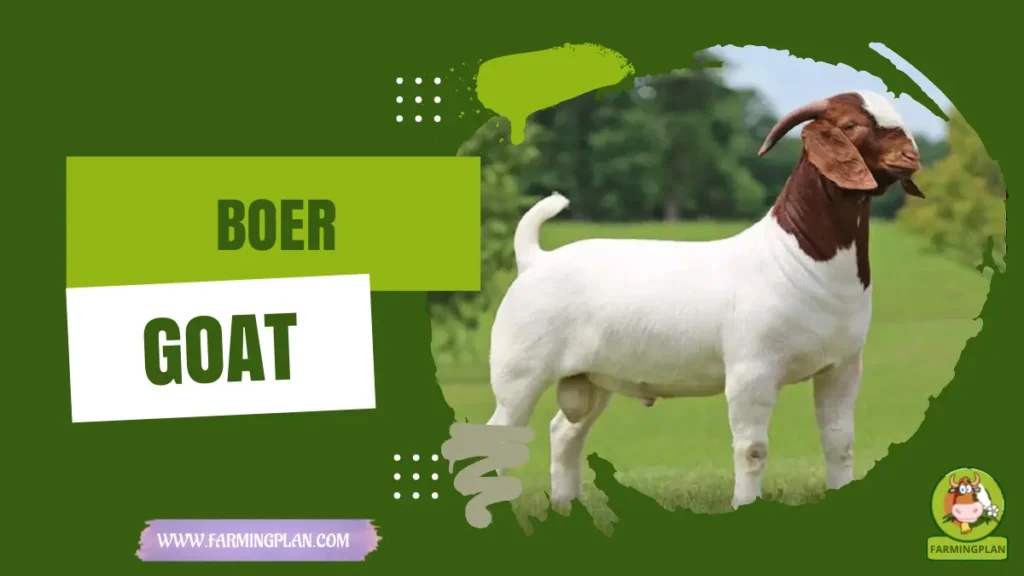
History & Origin of Boer Goats
Boer goats were first found in South Africa and there they were developed. When the Dutch came to New Netherland in the 17th century, they mated local goats with European hybrids to better their livestock and formed today’s Boer. Over the years, their meat and health have continued to be strong points in this breed. When they were first found only in South Africa, thisgoats soon became popular among farmers everywhere.
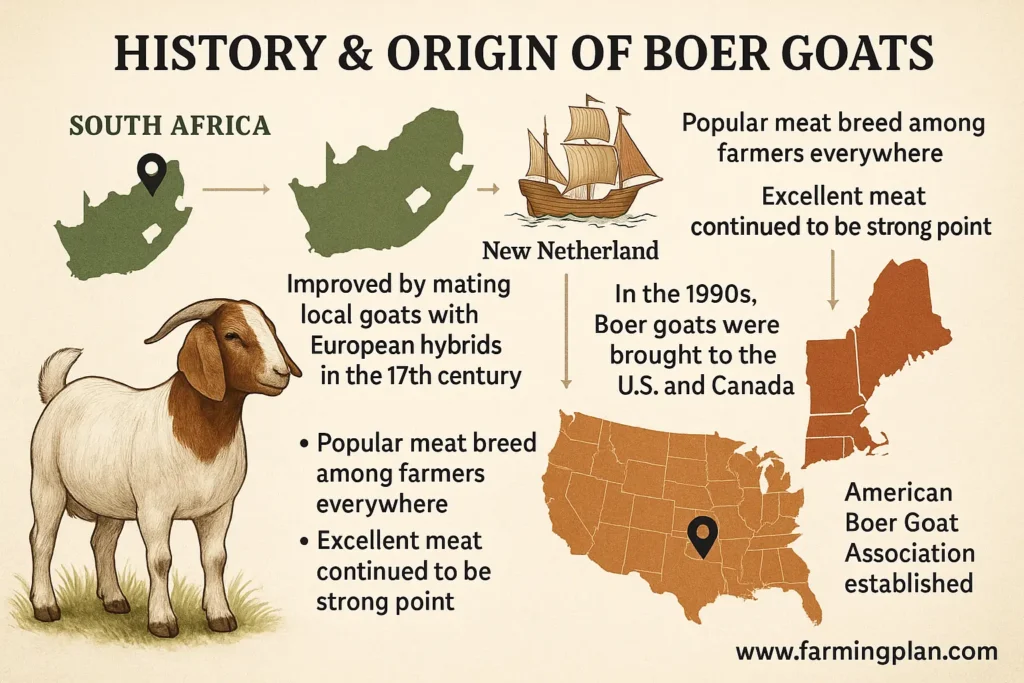
In the 1990s, Boer goats were brought to the U.S. and Canada and soon became known for their excellent meat. Because of their good health and fast rate of growth, they were quickly accepted as important animals in the meat goat industry. The American Boer Goat Association was established to keep breeding under control and to make sure thisgoats are of high quality, enhancing its recognition as a great meat breed.
Characteristics of Boer Goats
People are attracted to the impressive look of this goats. They are famous for their solid, sturdy body which helps them function in any climate. The unique white body and brown or red-brown head on a pigeon mean they are quite easy to spot. Generally, adults weigh 120-230 pounds, but males called bucks may be as heavy as 300 pounds. Because of this, they are valued for their impressive meat output.
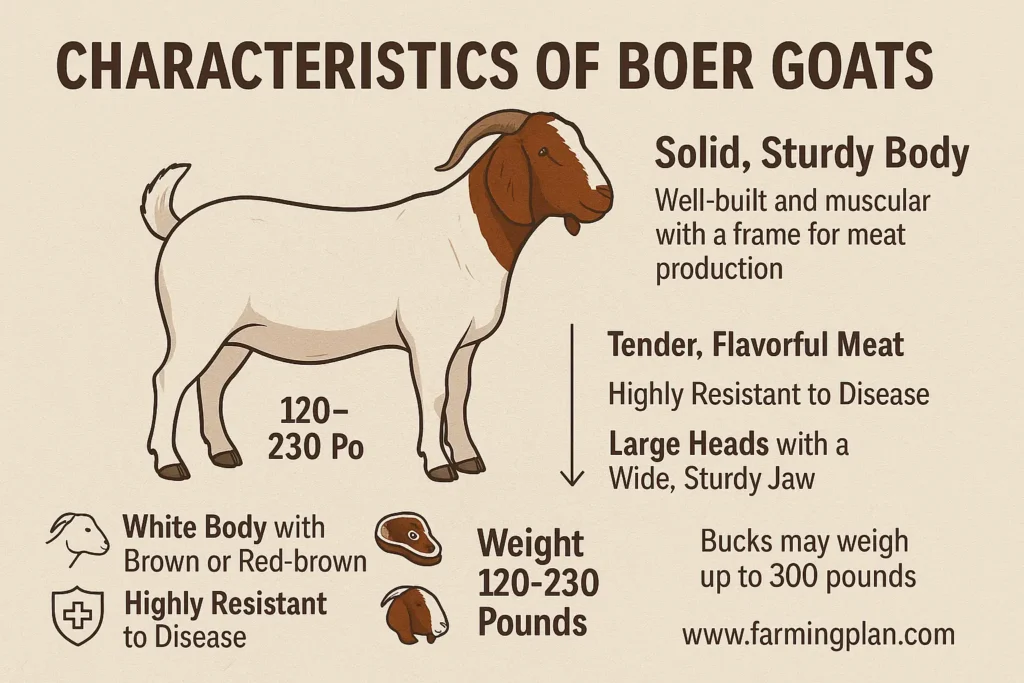
These goats have strong, well-built bodies that are perfectly suited for producing high-quality meat. Their large heads, often with a wide, sturdy jaw, contribute to their muscular frame. This goats are bred specifically for meat production, so they tend to have low-fat content and tender, flavorful meat. Thanks to years of selective breeding, they are also highly resistant to diseases, making them easier to manage on a farm.
Nature & Temperament
You will not find many friendlier or more relaxed animals than Boer goats on a farm. Because they’re calm and patient, they make great pets for first-time goat keepers. The way they treat people and animals with friendliness makes them good for farming and for becoming family pets.
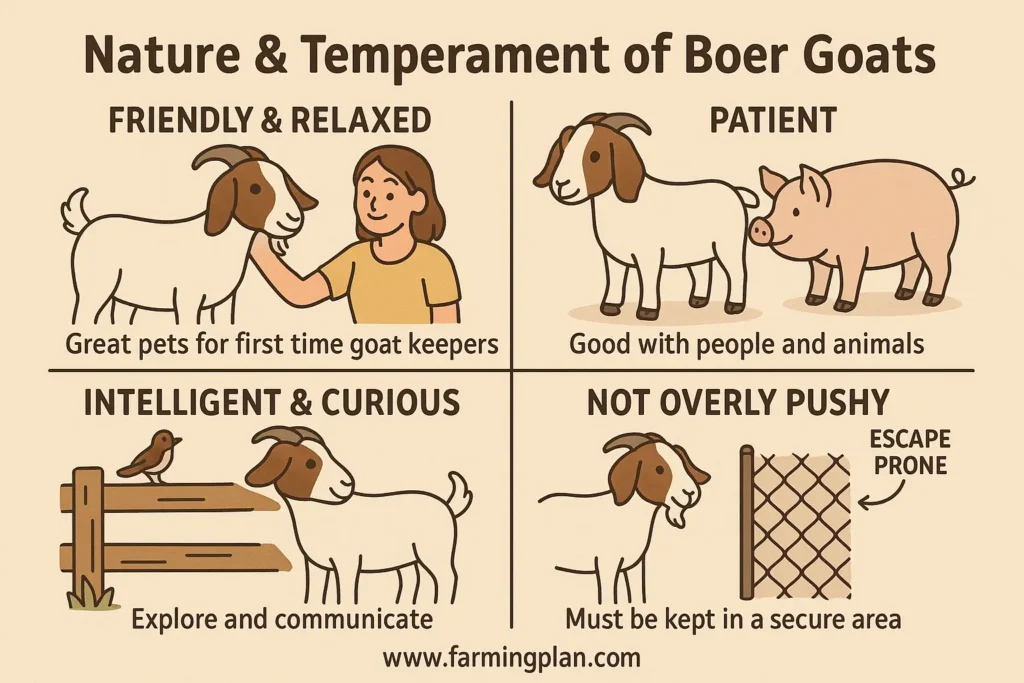
These goats are not only intelligent but also curious, enjoying to look around and communicate with other living things. Although not overly pushy, this goats must be kept in a secure area, as they can easily escape if it seems possible. Regardless of if you plan to eat them or just have them as pets, pigs with a sweet temperament always make good members of any group.
Read More: African Pygmy Goat: Adorable, Versatile Farm Animal
Food & Diet of Boer Goats
Proper feeding is needed for Boer goats to remain healthy and grow well. Goats are healthy on a diet of food made from fresh grass, hay and a bit of grains. Because this goats grow and develop rapidly, their nutrition should include extra protein compared to other goat breeds. It requires feeding them hay along with grains every so often during the months they are growing.
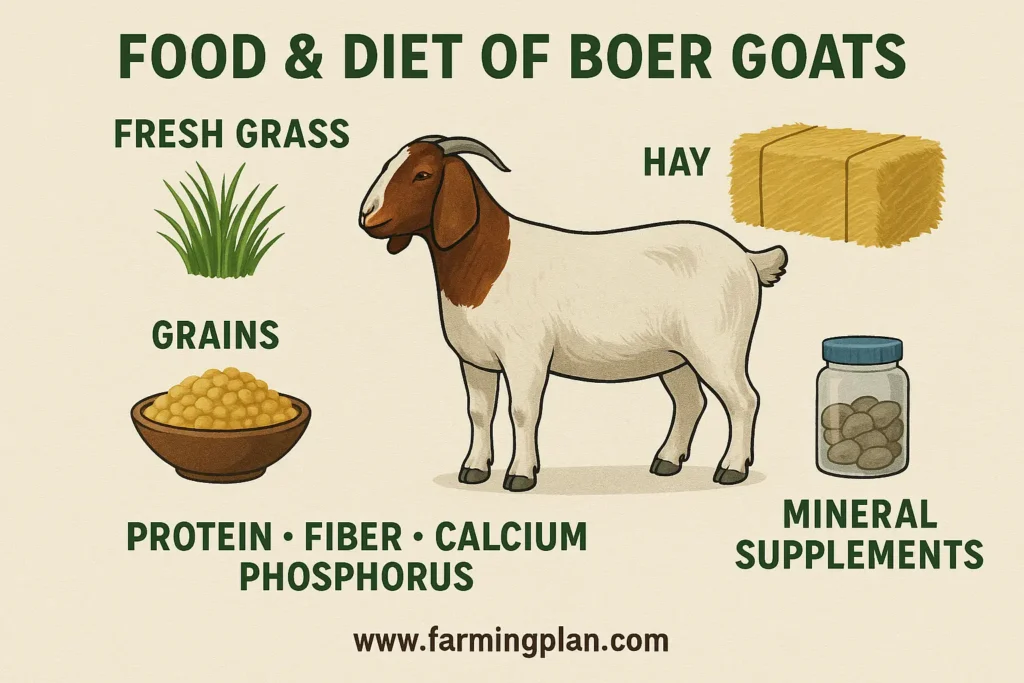
Boer goats should be fed the right nutritious food for their health. An animal’s food should contain adequate amounts of fiber, calcium and phosphorus. sometimes adding mineral supplements helps maintain their good health. Providing fresh water at all times helps your fish stay healthy through the summer heat. A healthy, balanced meal will make sure that goats grow properly and develop the highly regarded this goat meat.
Usage/Purpose
This goats are primarily raised for their meat, which is prized for being lean, flavorful, and tender. Their rapid growth rate and large frame make them perfect for commercial farming, especially in the meat goat industry. This goats are also used for breeding purposes. Because of their strong genetics and disease resistance, they are often chosen as breeding stock to produce high-quality offspring.
Besides meat production, Boer goats are increasingly being used as pets in some households. Their friendly demeanor and low maintenance make them ideal for people looking for a companion animal. Some owners even use this goats as emotional support animals due to their calm and loving nature. Whether for meat, breeding, or companionship, this goats serve a variety of purposes, making them a versatile and valuable addition to any farm.
Read More: Jakhrana Goat: The Rajasthani Dairy Goats
Special Features of Boer Goats
Boer goats come with a variety of special features that make them stand out in the farming world. One of their most notable traits is their natural resistance to many common goat diseases. This resistance is a result of centuries of selective breeding, ensuring that this goats are healthier and less prone to illness than other breeds. This characteristic makes them easier to manage and reduces the need for frequent veterinary visits.
Another special feature is their impressive meat quality. this goats are specifically bred for meat production, and their meat is known for being tender, lean, and full of flavor. The carcass of a Boer goat has excellent qualities, and they yield more high-quality meat compared to other breeds. Their ability to grow quickly and efficiently adds to their overall value as a meat goat.
Read More: British Alpine Goat: Meat, Milk & Markings
Health Issues & Prevention
While Boer goats are generally healthy and resilient, they are still susceptible to a few health issues. Common diseases include parasites, respiratory infections, and digestive problems like bloat or enterotoxaemia. Regular checkups and vaccinations are crucial to prevent these conditions. This goats are also prone to foot rot if not properly cared for, so maintaining good hygiene is essential.
Prevention starts with proper nutrition and regular deworming. It’s important to monitor the goats’ condition, paying attention to their coat, weight, and overall demeanor. Ensuring they have a clean, dry environment and are kept away from overcrowded conditions will help reduce stress and illness. With proper care, this goats can live long, healthy lives and continue to produce quality meat and offspring.
“Raising Boer Goats Is Not Just About Meat, It’s About Cultivating A Strong, Healthy Herd That Will Thrive On Your Farm!”
Step-by-Step Farming Guide for Boer Goats
Raising Boer goats requires careful preparation, from setting up a secure farm with ample space to choosing healthy breeding stock and ensuring a balanced, nutritious diet to support their growth and overall well-being.
Step 1: Setting Up Your Farm for Boer Goats
Before bringing Boer goats to your farm, ensure that you have adequate space. This goats require a large area to roam, graze, and exercise. They need strong fencing, as they are known to escape if given the chance. Set up a shelter where they can rest and stay protected from extreme weather conditions. The shelter should be dry, clean, and well-ventilated.
Step 2: Choosing the Right Boer Goats
When selecting Boer goats, ensure that you choose healthy, strong animals from reputable breeders. If you’re breeding this goats, invest in high-quality breeding stock to maintain the health and productivity of your herd. Look for goats with no signs of illness, and ensure they have strong, healthy hooves and clear eyes.
Step 3: Feeding and Nutrition
Once you have your Boer goats, it’s time to focus on their diet. Provide them with a variety of high-quality hay, fresh grass, and grains. Ensure that their diet is well-balanced, with sufficient protein, calcium, and phosphorus to support their growth. Consider providing mineral supplements to keep their health at its peak.
Expert Tips & Best Practices for Boer Goat Owners
- Regular Health Checks: Ensure your Boer goats receive regular vaccinations and health checks. Keep an eye out for signs of illness and seek prompt treatment if needed.
- Manage Breeding: Be strategic with breeding to ensure high-quality offspring. Select only the best goats for breeding stock, ensuring they have desirable traits like disease resistance and fast growth.
- Proper Fencing: Boer goats are escape artists. Ensure your fencing is strong and high enough to prevent them from escaping.
Where to Buy Boer Goats
If you’re looking to buy Boer goats, there are several places you can go. Reputable breeders are your best bet. You can check out the American this Goat Association or the Canadian Boer Goat Association for lists of breeders. Additionally, farms like Fripp Family Farm and Bleating Heart Farm offer this goats for sale. Online marketplaces like Craigslist and specialized goat forums can also be a good place to start.
FAQ
What is the average weight of a Boer goat?
Boer goats typically weigh between 120-230 pounds, with bucks sometimes reaching over 300 pounds.
Are Boer goats friendly pets?
Yes, Boer goats are known for their calm, friendly nature, making them great pets for families and farmers alike.
How fast do Boer goats grow?
Boer goats grow rapidly, with kids reaching market weight (approximately 100-120 pounds) in just 6-8 months.
Where can I buy Boer goats?
Boer goats can be bought from reputable breeders, online marketplaces, or farms like Fripp Family Farm.
What diseases are Boer goats prone to?
Boer goats are generally healthy, but they can be susceptible to parasites, respiratory infections, and foot rot.
Conclusion
Boer goats are a fantastic breed for anyone interested in raising goats for meat production, breeding, or even as pets. With their friendly temperament, disease resistance, and impressive meat quality, they are a valuable addition to any farm. By following proper care guidelines and investing in quality breeding stock, you can ensure your Boer goats thrive, providing you with years of enjoyment and high-quality meat.
